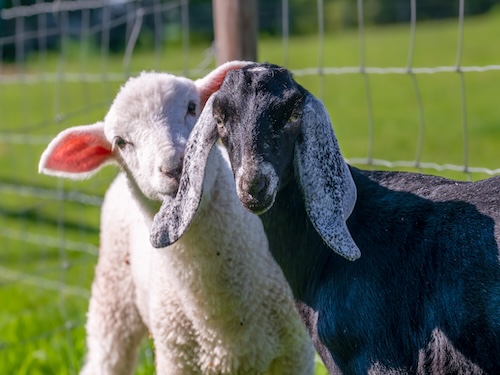What To Know if You Want to Add Sheep and Goats to the Mix
Aug 25, 2025

For those with acreage looking to step into livestock, sheep and goats could prove a solid addition to the farm.
Sheep and goats make a positive package if you don’t have hundreds of acres of pastureland.
While the opportunity to add animals to the mix is exciting, Jessy Shanks said to do the homework first.
“The first thing I tell people is to do your research,” said Shanks, who is the University of Tennessee Extension specialist for small ruminants. “Figure out which type of animal you want, be it a sheep or a goat. Depending on what you get, a sheep might need to be sheared if it’s not a hair breed. I talk with people about type selection: meat versus wool. Do you want a sheep that needs shearing every year? Things like that go along with do your research.
Unlike other livestock, sheep and goats could prove vital in brush management and where other livestock don’t make sense.
“We tend to recommend sheep and goats to those farmers who have smaller acreage, where they could only raise one or two cows, where cattle wouldn’t make sense for a profit,” said Shana Danielle DeLozier, University of Tennessee Ag Extension agent for Davidson County. “You can raise more sheep and goat on smaller acreage. They have a lot of value that you can use.”
Not to mention, as Middle Tennessee grows, so do the tastes of consumers. DeLozier explained that sheep and goat are becoming more of a protein source for everyday purchasers and restaurants.
“That’s why some have found it great to raise goat for meat,” DeLozier said. “Then you have goat milk for soaps, lotions, even milk to just drink or cheese.”
What these animals need from you
As Shanks mentioned, those interested in taking on a herd need to do the groundwork first.
Four of either animal is suitable for one or two acres. Sheep and goats can do a more targeted grazing for invasive species and weeds, but both require fencing.
Particularly for goats, Shanks described them as escape artists.
“Goats specifically, they need really good fencing,” she said. “They like to climb, and they can climb under fences and gates. They can crawl under things.”
Both animals need a deworming process, and they do need their farmers to check on them once or twice a day.
What you can get at your Co-op
Fencing supplies are available the Co-op closest to you. And while goats love to eat the brush before them, different varieties of goat food are available through our Co-op Feeds line.
We also offer supplement blocks, buckets, and minerals. Those same products are available for sheep.
Sheep and goats make a positive package if you don’t have hundreds of acres of pastureland.
While the opportunity to add animals to the mix is exciting, Jessy Shanks said to do the homework first.
“The first thing I tell people is to do your research,” said Shanks, who is the University of Tennessee Extension specialist for small ruminants. “Figure out which type of animal you want, be it a sheep or a goat. Depending on what you get, a sheep might need to be sheared if it’s not a hair breed. I talk with people about type selection: meat versus wool. Do you want a sheep that needs shearing every year? Things like that go along with do your research.
Unlike other livestock, sheep and goats could prove vital in brush management and where other livestock don’t make sense.
“We tend to recommend sheep and goats to those farmers who have smaller acreage, where they could only raise one or two cows, where cattle wouldn’t make sense for a profit,” said Shana Danielle DeLozier, University of Tennessee Ag Extension agent for Davidson County. “You can raise more sheep and goat on smaller acreage. They have a lot of value that you can use.”
Not to mention, as Middle Tennessee grows, so do the tastes of consumers. DeLozier explained that sheep and goat are becoming more of a protein source for everyday purchasers and restaurants.
“That’s why some have found it great to raise goat for meat,” DeLozier said. “Then you have goat milk for soaps, lotions, even milk to just drink or cheese.”
What these animals need from you
As Shanks mentioned, those interested in taking on a herd need to do the groundwork first.
Four of either animal is suitable for one or two acres. Sheep and goats can do a more targeted grazing for invasive species and weeds, but both require fencing.
Particularly for goats, Shanks described them as escape artists.
“Goats specifically, they need really good fencing,” she said. “They like to climb, and they can climb under fences and gates. They can crawl under things.”
Both animals need a deworming process, and they do need their farmers to check on them once or twice a day.
What you can get at your Co-op
Fencing supplies are available the Co-op closest to you. And while goats love to eat the brush before them, different varieties of goat food are available through our Co-op Feeds line.
We also offer supplement blocks, buckets, and minerals. Those same products are available for sheep.